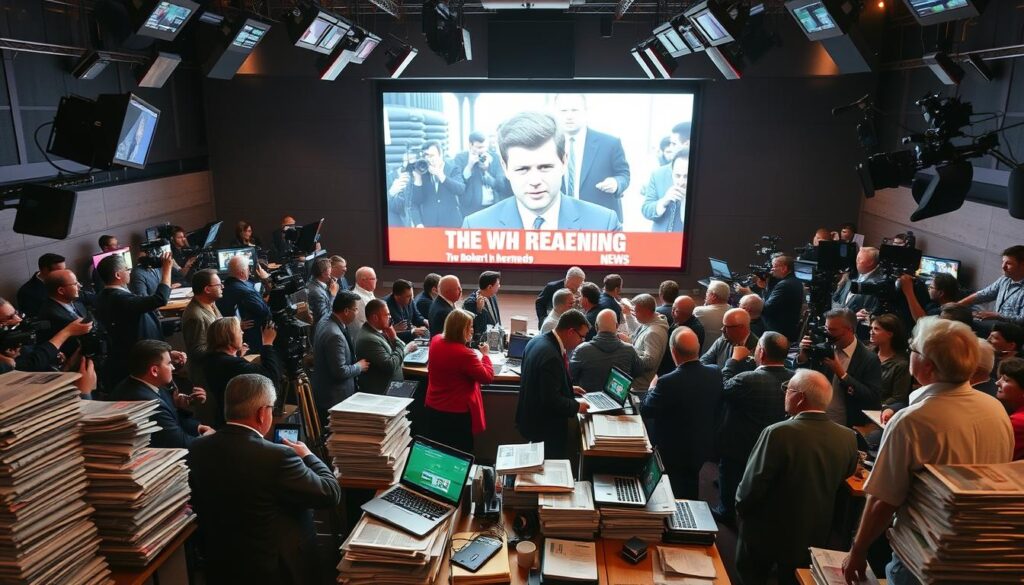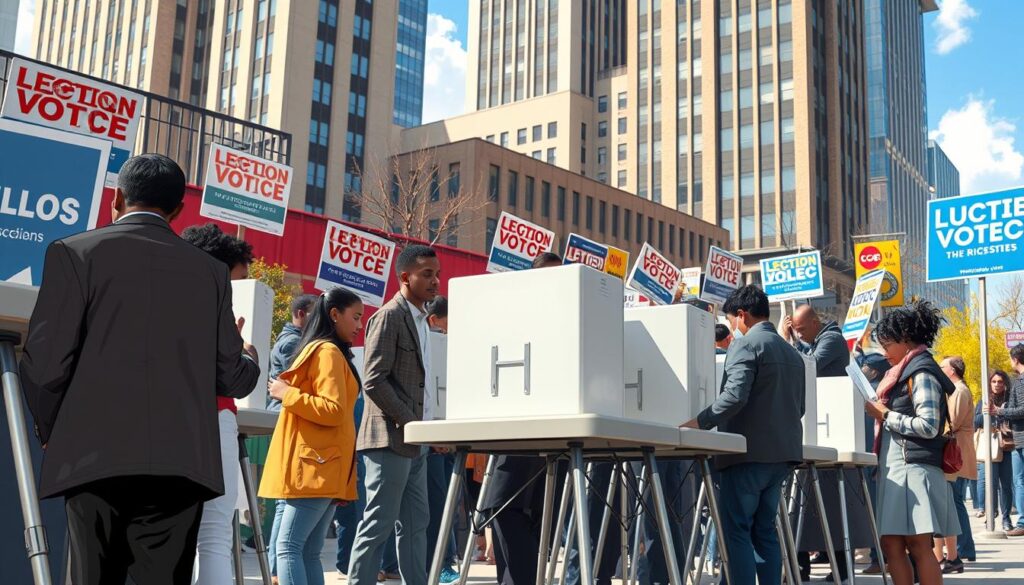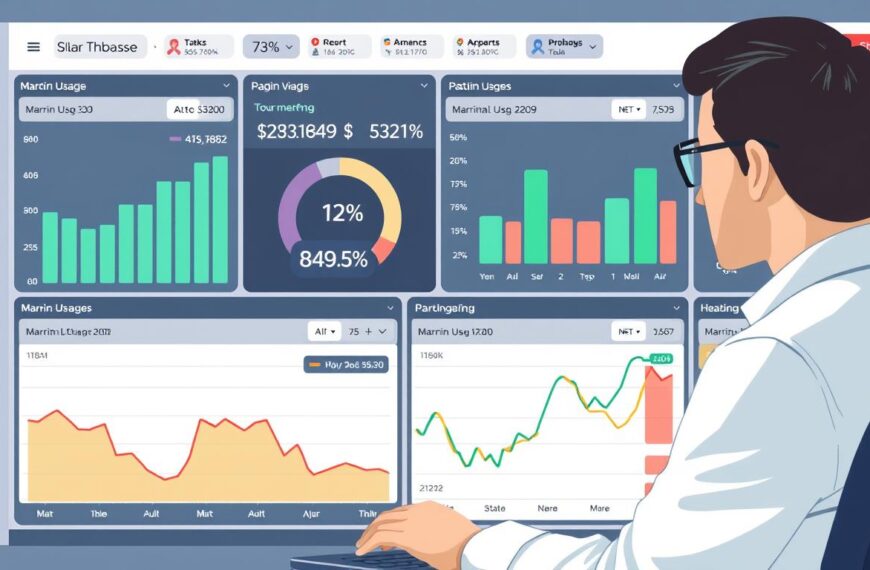The 2024 presidential race has seen a big change with Robert F. Kennedy Jr. entering the scene. A poll by Jeremy Zogby in December 2021 found Kennedy as the most heroic figure in American politics. This shows the Kennedy name still holds a lot of power.
Kennedy’s fight against COVID-19 has boosted his popularity. He now has around 5% of the vote nationally. His appeal to young and Latino voters could be key in the election. He’s also strong in states like Arizona and Nevada, which could change the election’s outcome.
Kennedy’s approval ratings are higher among Republicans. This has caught the attention of billionaire Trump supporter Timothy Mellon. He gave $25 million to a Kennedy super PAC, suggesting Kennedy could affect the Democratic Party’s chances.
Key Takeaways
- Robert F. Kennedy Jr. ranked as the most heroic figure in a national survey, surpassing notable personalities like the Pope and Oprah.
- Kennedy’s polling numbers nationally are around 5%, with particular strength among young and Latino voters.
- Kennedy’s presence in key battleground states could potentially impact the 2024 presidential election outcomes.
- Kennedy’s approval ratings are higher among Republicans, indicating a diverse support base.
- A billionaire Trump supporter contributed $25 million to a Kennedy-affiliated super PAC, hinting at the perception that Kennedy’s campaign could act as a spoiler for the Democratic Party.
The Kennedy Legacy’s Modern Political Impact
The Kennedy name is still a big deal in American politics. Robert F. Kennedy Jr.’s campaign has brought up old debates about the family’s legacy. His campaign’s use of images from his uncle’s 1960 ad has caused family controversy.
Some say he’s using the family’s legacy in a way that’s not right. They think he’s trying to make himself out to be a modern-day hero, like his uncle was seen as.
Historical Significance of the Kennedy Name
The Kennedy family has been a big part of American politics for a long time. Robert F. Kennedy Jr.’s campaign is using the family’s name to remind people of his uncle’s 1968 run. It’s bringing up memories of the Kennedy dynasty.
Evolution of Political Dynasty
The Kennedy family’s role in politics has changed over the years. Robert F. Kennedy Jr.’s campaign is trying new things, which is making people think about what the Kennedy name means today. It’s sparking debates about where the family’s legacy is headed.
Public Perception Changes
How people see the Kennedy family has changed lately. Some are upset about how the campaign is using the family’s name. Others think it’s good that the Kennedy name is still relevant in politics.
As Robert F. Kennedy Jr.’s campaign goes on, people will keep talking about the Kennedy family’s impact on politics.
| Event | Year | Impact |
|---|---|---|
| Robert F. Kennedy’s victory in the California Democratic primary | 1968 | Positioned him as the likely Democratic nominee for the 1968 presidential election |
| Over 30,000 additional American soldiers killed in Vietnam | During Nixon’s presidency | Continued the conflict for political reasons, in contrast to Robert Kennedy’s opposition to the war |
| The Civil Rights Act of 1964 and Voting Rights Act of 1965 | 1964-1965 | Part of the legacy that Robert Kennedy would have expanded upon if elected president |
“The Robert F. Kennedy Memorial and its Human Rights Center support activists globally and created major award programs.”
The Kennedy family’s legacy is still influencing American politics. Robert F. Kennedy Jr.’s campaign is using the family’s name and history to make a point. It shows how the Kennedy dynasty is evolving.
Robert Kennedy’s Campaign Launch and Strategy
In April 2023, Robert F. Kennedy Jr. announced his run against President Biden for the 2024 Democratic nomination. He brought on former congressman Dennis Kucinich as his campaign manager. But, in October, Kennedy surprised everyone by going independent, aiming to upset both major parties.
Kennedy’s campaign uses his outsider status to his benefit. He promotes conspiracy theories, like Wi-Fi causing cancer and antidepressants leading to school shootings. He also doubts AIDS is caused by HIV and has made false claims about vaccines.
Getting on the ballot and debating are big hurdles for Kennedy. He’s working hard to meet state rules and polling numbers. Despite starting strong, his support has dropped to single digits since Vice President Harris became the Democratic nominee.
| Key Campaign Strategies | Challenges Faced |
|---|---|
|
|
Kennedy’s campaign has changed, but his outsider status and fringe beliefs are key. As an independent candidate, he faces a tough fight. Yet, his campaign strategy keeps sparking debate and attention.
From Democratic Candidate to Independent Runner
Robert Kennedy Jr. made a surprising move in October 2023. He switched from the Democratic primary to an independent candidacy. This change came after he realized he couldn’t compete in the crowded field.
By going independent, Kennedy aimed to attract voters unhappy with the two-party system. He wanted to be a spoiler for both major parties.
Campaign Strategy Shifts
Switching to an independent candidate required big changes for Kennedy’s campaign. He had to change how he raised money, rebuild his volunteer base, and update his message. Kennedy’s team focused on his independence and his readiness to challenge the status quo.
Political Positioning Changes
As an independent, Kennedy aimed to appeal to more voters. He positioned himself as a moderate, different from the extremes of both parties. He adjusted his views on healthcare and environmental issues to gain support from all sides.
Transition Timeline
- October 2023: Kennedy announces his transition from the Democratic primary to an independent candidacy.
- November 2023: Kennedy’s campaign faces significant challenges in obtaining ballot access across the country, with only around 20 states confirming his inclusion.
- August 2024: Kennedy’s support in national polls drops from an initial 15% to the low single digits, with the latest NPR/PBS News/Marist poll showing him at 5%.
- September 2024: Kennedy suspends his independent presidential campaign, citing the financial and logistical hurdles of running without major party support.
Robert Kennedy Jr.’s decision to run as an independent was bold. But, it was tough to beat the obstacles faced by third-party candidates in the U.S.
Robert Kennedy News: Coverage and Media Impact
Robert F. Kennedy Jr.’s presidential campaign has gotten a lot of media coverage. This includes both good and bad comments. His views on vaccines and COVID-19 have been talked about a lot, changing the political news scene.
His unique voice and personal story have also caught a lot of media attention. This has helped shape how people see him.
Social media sites like Facebook and Instagram have blocked accounts linked to Kennedy’s anti-vaccine group. This has made it harder for him to use these platforms to reach voters. But, Kennedy’s team has used the media buzz, including the controversies, to keep people interested and engaged.
Recent polls show Kennedy’s support is in the mid-single digits. This has raised questions about how much he could affect the election. While some Republicans might like him, his support for Donald Trump has caused problems in his family. Several family members have spoken out, saying they’re disappointed and still support Harris.
“Kennedy’s decision to endorse Trump caused tension within his family, with five family members issuing a statement expressing disappointment and reiterating support for Harris.”
The Harris campaign is interested in talking to Kennedy’s supporters who might not want to vote for Trump. As the campaign goes on, how the media and the public see Kennedy’s views will keep changing the political news and campaign publicity.
Key Campaign Issues and Policy Positions
Robert Kennedy Jr.’s campaign has focused on several key issues. These include healthcare, vaccine policies, environmental policies, and foreign policy. His views on these critical areas have sparked both support and controversy among voters.
Healthcare and Vaccine Stance
Kennedy’s stance on healthcare and vaccines has been a central issue. He has been a vocal opponent of mandatory vaccination policies. He cites concerns about vaccine safety and the influence of pharmaceutical companies.
Kennedy claims that chronic diseases affect 50% of children in the U.S. This has raised concerns among public health experts.
Environmental Policies
Kennedy’s background as an environmental activist has shaped his environmental policies. He advocates for policies to address climate change, pollution, and sustainability. However, the specifics of his environmental platform have been subject to scrutiny and debate.
Foreign Policy Views
On foreign policy, Kennedy has taken a more isolationist stance. He opposes military aid to Ukraine while supporting Israel’s actions in Gaza. This positioning has drawn criticism from some voters who view it as a departure from traditional U.S. foreign policy positions.
Kennedy’s campaign has also faced internal conflicts over issues like abortion. Differing views between the candidate and his running mate have caused tension within the team. As the election approaches, voters will continue to closely examine Kennedy’s policy positions and their potential impact.
| Issue | Kennedy’s Position | Potential Impact |
|---|---|---|
| Vaccine Policies | Opposes mandatory vaccination, cites concerns about safety and pharmaceutical influence | Controversial stance that could alienate some voters but appeal to anti-vaccine supporters |
| Environmental Policies | Advocates for policies addressing climate change, pollution, and sustainability | Aligns with growing environmental concerns but faces scrutiny over specifics |
| Foreign Policy | Opposes military aid to Ukraine, supports Israel’s actions in Gaza | Isolationist stance departs from traditional U.S. foreign policy, drawing both praise and criticism |
Polling Performance and Voter Demographics
The 2024 presidential election is heating up, and Robert F. Kennedy Jr.’s campaign is under the spotlight. Surveys show Kennedy’s support at about 5% nationally. But, he’s doing well with young and Latino voters.
In key states like Arizona, Nevada, Georgia, and Wisconsin, Kennedy’s numbers are promising. His appeal is strong among Republicans, even though he’s a Democrat. This could be a big plus for his campaign.
However, Kennedy’s support might drop as the election gets closer. Polls show his numbers could go down. His strong backing from low-propensity voters might not show up in likely-voter polls.
Voter Enthusiasm and Party Affiliation
Kennedy’s supporters are less excited than those for his opponents. Only 23% of Kennedy’s fans say they’re extremely motivated to vote. In contrast, about 70% of Harris and Trump supporters feel the same way.
Most of Kennedy’s supporters are independents or from other groups. Only 14% are Republicans, and 12% are Democrats. This mix of supporters could be both a blessing and a challenge for Kennedy’s campaign.
| Candidate | Favorable Opinion | Unfavorable Opinion | No Opinion |
|---|---|---|---|
| Robert F. Kennedy Jr. | 47% | 47% | |
| Kamala Harris | 55% | 42% | 3% |
| Donald Trump | 50% | 48% | 2% |
As the campaign goes on, election polls, voter demographics, and political support will be key. They will shape the outcome of this unique presidential race.
Campaign Funding and Super PAC Support
Robert F. Kennedy Jr.’s campaign has received a lot of money. Timothy Mellon, a big supporter of former President Trump, gave $25 million to a Kennedy super PAC. Nicole Shanahan, Kennedy’s running mate, also brought in money because of her wealth.
The campaign is balancing traditional fundraising with super PAC support. But, this has raised questions. Some think the super PAC might hurt the Democratic party.
Major Donors Analysis
People are looking into why big donors are backing Kennedy. Some think his campaign could split the Democratic vote. This could help Republicans in the end.
Campaign finance groups and the Democratic National Committee (DNC) are worried. They think there might be illegal coordination between Kennedy’s campaign and the super PAC.
Financial Strategy Overview
The campaign is using grassroots fundraising and super PACs like American Values 2024 PAC. This PAC plans to spend at least $15 million to help Kennedy. They aim to hire firms to get the needed signatures.
But, the DNC is concerned about the PAC’s fundraising. They say it might break campaign finance laws. The PAC is accused of not showing loans and major donor support, like Timothy Mellon’s.
“The Democrats filed a complaint against Kennedy’s campaign, claiming it took shortcuts and violated federal campaign finance laws.”
Experts say these financial moves are “very unusual.” They think they might make Kennedy’s campaign seem more funded than it is. The DNC worries these actions could harm the election’s integrity.
Family Response and Dynasty Dynamics
When Robert F. Kennedy Jr. started his own presidential campaign, his family was not supportive. His siblings, including Kerry Kennedy, Rory Kennedy, Joe Kennedy II, and Kathleen Kennedy, spoke out against it. They said it was “perilous for our country.”
The Kennedy family, known for their political influence, are worried. They feel Kennedy Jr. is misusing their name and legacy in his campaign. Some family members are privately upset, seeing it as a misuse of the Kennedy name.
The Kennedy family’s unity is at risk. Personal ambitions are clashing with the family’s image. At 96, Ethel Kennedy, the family matriarch, celebrated her birthday with her family. It was a reminder of their lasting legacy.
But, the family’s divisions are growing. Members like Kerry Kennedy, Rory Kennedy, Joe Kennedy II, and Kathleen Kennedy openly disagree with Bobby Kennedy Jr.’s presidential bid. They see it as a danger to the country.
This campaign has shown the tension between personal goals and family legacy. It highlights the challenges when a famous family’s history is involved.
“Robert F. Kennedy Jr.’s candidacy has caused a public feud with his siblings over political disagreements, specifically concerning his opposition to President Biden.”
Ballot Access Challenges and Solutions
Robert F. Kennedy Jr.’s independent presidential campaign was gaining speed. Yet, it hit many hurdles in getting on state ballots. They had met the requirements for 15 states, but only five had confirmed Kennedy as a candidate.
Each state had its own legal and bureaucratic obstacles. The campaign worked hard to get on ballots in key states. This was essential for Kennedy to join the presidential debates.
State-by-State Progress
- Kennedy was set to appear on the Michigan ballot as of September 9.
- Despite missing the deadline, Kennedy was removed from the Nevada ballot.
- The North Carolina Supreme Court ruled that Kennedy will not be on the ballot in that state.
- Kennedy withdrew his name from the ballot in Texas on the same day he suspended his campaign.
- A judge granted Kennedy’s request to withdraw his candidacy in Pennsylvania on August 23.
- A recent court ruling in Georgia determined that Kennedy was “not qualified” to appear on the ballot.
- The Wisconsin Elections Commission certified that Kennedy would appear on the ballot in Wisconsin, rejecting his request to withdraw.
Legal Hurdles
The campaign faced many legal challenges. These included issues with signatures, paperwork defects, and party affiliations. These problems led to legal actions and court decisions that affected Kennedy’s ballot access.
Securing ballot access is key for Kennedy’s campaign. It will decide if he can join the presidential debates and reach more people. The campaign’s strategy and resources will be vital in overcoming these legal and bureaucratic hurdles.
| State | Ballot Access Status |
|---|---|
| Michigan | Certified |
| Nevada | Removed |
| North Carolina | Not Certified |
| Texas | Withdrew |
| Pennsylvania | Withdrew |
| Georgia | Not Qualified |
| Wisconsin | Certified |
The campaign’s efforts to get on key state ballots are crucial. They are vital for Kennedy to join the presidential debates and reach more people. As the election season goes on, the team will face many legal and bureaucratic challenges. They must ensure Kennedy’s name is on as many ballots as possible.
Impact on Battleground States
Robert Kennedy Jr.’s independent campaign could change the election, especially in key states. He’s polling at 5% in Michigan and 8% in New Mexico. These are swing states in the 2024 election.
Nationally, Kennedy is at 3.6%. This might seem small, but it could be big in a close race. Before he dropped out, 16% of swing voters wanted to vote for him. This shows he has a lot of appeal.
Even though Kennedy is out, he’ll still be on ballots in up to 23 states. This includes important swing states like North Carolina, Michigan, and Wisconsin. His supporters might still vote for him, which could change the election’s outcome.
Polling shows Kennedy’s support is even among Republicans and Democrats. But after President Biden backed Vice President Kamala Harris, some Kennedy fans moved to the Democratic side.
The debate is ongoing about Kennedy’s effect on battleground states. Some think it will be big, while others see little impact. But with tight margins in states like Georgia and Arizona in 2020, even a small change could be huge in 2024.
“Kennedy’s presence on the ballot in Michigan, a crucial swing state, is significant. The campaign’s impact in states like Arizona, Nevada, Georgia, and Wisconsin could be decisive, given the narrow margins in these states in 2020.”
As the election gets closer, the effect of Robert Kennedy Jr.’s campaign on battleground states will get more attention. The results in these states could decide who wins the 2024 presidential election.
Campaign Leadership and Key Personnel
Robert F. Kennedy Jr.’s presidential campaign was exciting, and people were curious about his team. Dennis Kucinich, a former congressman, was his campaign manager. He’s known for his progressive views. Nicole Shanahan, a tech entrepreneur, was his running mate. She brought a lot of money but also faced criticism.
The team faced some tough times. Angela Stanton King, who worked on Black engagement, left. She said the atmosphere was too hateful. Choosing the right people was key for the campaign’s success.
The team was diverse, with people from different backgrounds. There were authors, lawyers, a TikTok star, and a CEO. This mix was both a strength and a challenge as they worked through the election.
| Position | Name | Background |
|---|---|---|
| Campaign Manager | Dennis Kucinich | Former Democratic Congressman |
| Running Mate | Nicole Shanahan | Wealthy Tech Entrepreneur |
| Senior Advisor | Angela Stanton King | Former Adviser for Black Engagement |
| Political Director | Jamie Woodson | Former State Legislator |
| Communications Director | Sarah Huckabee Sanders | Former White House Press Secretary |
| Field Director | Ronnie Musgrove | Former Governor of Mississippi |
| National Press Secretary | Greg Gutfeld | Fox News Host |
The team behind Robert F. Kennedy Jr.’s political advisors, campaign team, and strategies were vital. They shaped his election strategy and campaign direction. As the campaign went on, how well they handled challenges would be crucial.
Media Platform Restrictions and Communications Strategy
Robert F. Kennedy Jr.’s presidential campaign has hit roadblocks due to social media bans. Platforms like Facebook and Instagram have shut down accounts linked to his group, Children’s Health Defense. This has cut off his digital reach and limited how he can talk to supporters.
To get around these bans, Kennedy’s campaign is changing its approach. They’re now using different platforms and traditional media to get their message out. This includes interviews, rallies, and direct talks with voters. Kennedy wants to avoid online censorship and share his views freely.
Kennedy’s campaign is focusing on his outsider status and his challenge to the status quo. He’s especially critical of government control over social media and COVID-19 vaccines. By being seen as a rebel against censorship, Kennedy hopes to connect with voters who are worried about big tech’s power and the suppression of free speech.






